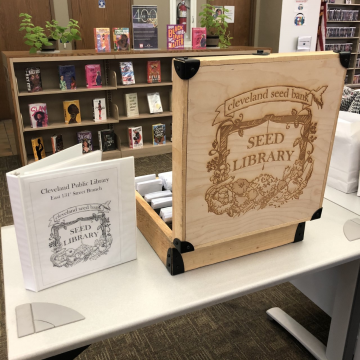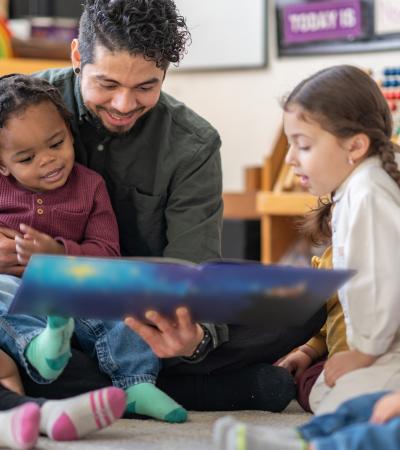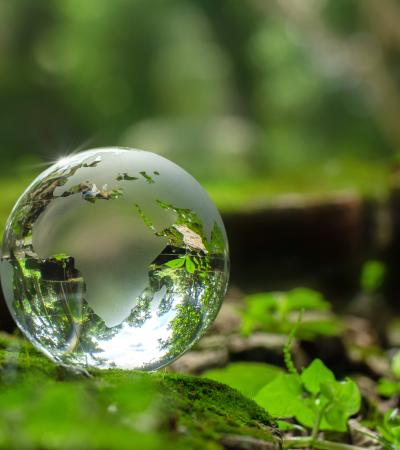For the 50th anniversary of Earth Day in 2020, ALA’s Sustainability Round Table set out to encourage libraries to participate with a list of fun and actionable ideas. The project — called “50 for 50,” with a goal set of 50 ideas — resulted in dozens of entries submitted by SustainRT members and friends over the coming year.
Now, with Earth Day 2021 approaching, the SustainRT Communications Committee is sharing some of their favorite ideas from the 50 for 50 list. Check out the selected entries below. To check out the whole list, visit the

Reusable tableware in breakroom (and for events)
Stocking your library’s breakroom with reusable cups, plates and flatware is an old idea that is new again in this age of disposable everything. This entry (from an unnamed contributor) reminds us that we can slow down the generation of landfill fodder and highlights that reusables are appropriate for more than just home.
While COVID-19 has certainly created a pause in the use of reusable tableware in a variety of settings to avoid transmission via contaminated surfaces, current science and CDC guidance recognizes that this route of transmission is low. Thus, it is possible to again imagine a future where disposable tableware need not be the norm.
Reusable tableware doesn’t need to be expensive or even breakable, and it doesn’t need to be limited to the breakroom, either. The Valley Library at Oregon State University created a “Party Pack” using Preserve’s recycled (and recyclable back to them) plastic collection for library events, both internal and external facing. While ditching the purchase of disposable tableware in favor of reusable options is not a “program idea,” it can be one impactful aspect of creating a for-real zero waste library program. Give it a try
Sustainability film series
Have meaningful conversations with your students or members of your community by hosting a film screening or series. This idea was submitted by Subject Librarian Lorraine Wochna from Ohio University, who has been collaborating with the Environmental Studies department since 2012 on sustainability-related film screenings and leading discussions afterwards. They have developed quite a following.
Consider partnering with a local environmental organization on this to help with leading discussions and answering questions. If you need some inspiration to get started, check out Films for the Earth for ideas.
Host a climate change World Café
Start the conversation about climate change at your library by hosting a Climate Change Café. The purpose of this exchange is to foster climate change discussion; to learn about pressing climate change issues; to create a support network of likeminded concerned citizens; and to come up with creative solutions or ideas for your community.
This can be a short-term series or a monthly program. This program idea was submitted by Research Services Librarian Madeleine Charney of University of Massachusetts Amherst. To get started, check out this helpful resource guide titled Climate Change World Café in Box.

Native plants and local pollinators
Several variations of this idea were submitted, including planting a local pollinator garden, starting a seed saving, make seed bombs, tree planting, or houseplant propagation program. Check out this seed library program at Cleveland Public Library submitted by Marina Marquez.
In their submission, April Griffith gave tips to prospective seed library starters to "seek out representatives from your state or local native plant society chapter to present a program on the importance of native plants to local pollinators. Native plants provide for insects, and local pollinators, typically at the foundation of local ecology systems. If you can pair this program before a native plant sale in the fall or spring, even better! People can take actions to get some local varieties in the be ground (or pot) right away."
Here are some instructions to create recycled seed stationery.
Start a slow stitch club
April Griffith, director of the Eureka Springs Carnegie Public Library in Arkansas, submitted three excellent library sustainability actions.
April advised librarians to "start a slow stitch club — similar to a knitting or crochet club but including and perhaps even emphasizing the mending of clothing and textiles.” In addition to offering the opportunity for patrons to set aside time to mend clothing, she also advised providing “opportunities for people to learn or share basic techniques and … a chance for fiber artists (beginners to advanced in their practice) to meet up, socialize and build community while they set time aside to repair everyday clothing items such as jeans, socks, etc. with contemporary embroidery techniques."
You can learn more about slow stitching and give this idea a try by visiting the Slow Stitching Movement website.
Local cookbooks and produce
April also submitted the fantastic idea to promote cookbooks with recipes that use locally and seasonally grown produce.
"If you have the facilities, create a cooking program series around this to help your community integrate easy plant-based meals into their home cooking repertoire," she said. In doing so, you can create community partnership opportunities with your local farmer's market. As part of your library’s outreach efforts, April suggests staffing a stall at the market for the Friends of the Library, story time, or crafts.
Conduct an energy audit
April Griffin and David Seldon encourage libraries to reach out to their local electric companies to see if they offer complimentary energy audits. If they do, librarians can schedule a consultant to visit the library and provide advice for increasing the facilities' energy efficiency. It’s a good idea to make a list and set goals to implement their recommendations as time and funding allow.
Energy efficiency improvements are about more than changing your lightbulbs, especially for libraries in older or historic buildings! Energy efficiency changes are often free or affordable actions that help library administrators act as good stewards of local tax dollars and garner positive PR for the library, especially when LEED-certified buildings are not realistic for your community.
If the local energy company can’t or won’t conduct an audit, work with students or educators in your community to set out a plan for developing a comprehensive greenhouse gas inventory.
ALA’s Sustainability Round Table was created as a venue in which members exchange ideas and opportunities regarding sustainability in order to move toward a more equitable, healthy and economically viable society. SustainRT is open to all ALA members and will include both individual members and organizational members.



